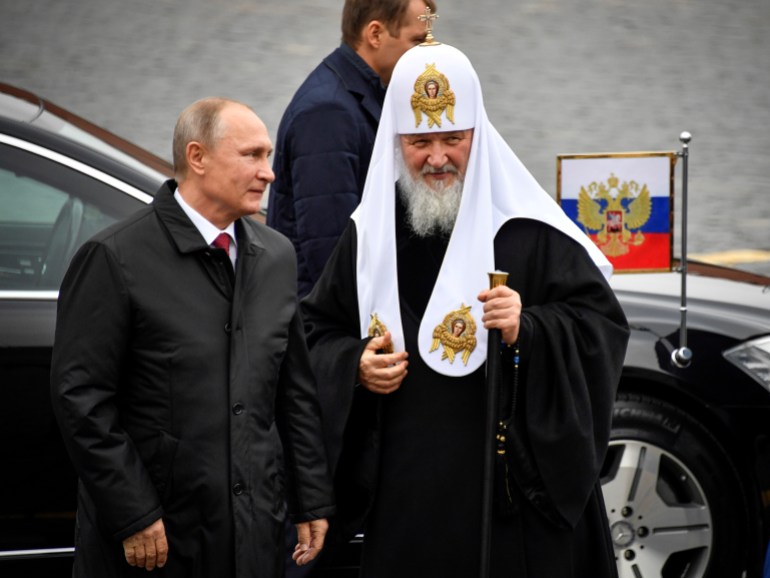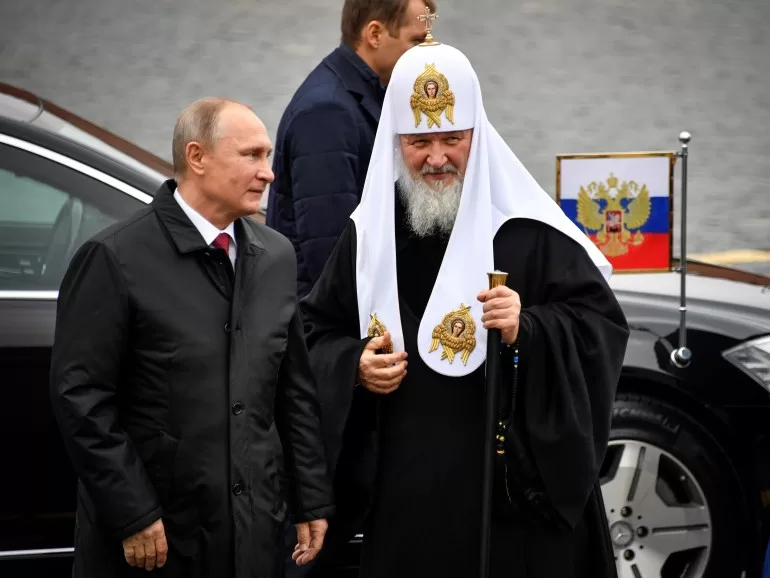Jesus Christ, frail and devoid of aggression, is portrayed right behind him.
Both are depicted on the billboard that reads “Christ triumphed over hell, and Russia will too”. This image is part of an outdoor art exhibition in central Moscow that urges Russian men to enlist.
Moscow Patriarch Kirill, head of the world’s largest Orthodox Christian Church whose clout transcends Russia’s borders to believers in former Soviet republics and diasporas, has defended the Kremlin’s “right” to start the war.
Russia has “the right to stand on the side of light, on the side of God’s truth”, he said days after the invasion began in February 2022.
The white-bearded 78-year-old known for his eloquence and business acumen promised eternal salvation to Russian servicemen fighting in Ukraine against “corrupting” Western values.
“[The West’s] goal was to take us with bare hands, without any war, to fool us, to make us part of their world, to inoculate us with their values,” Kirill said last April.

The Russian Orthodox Church (ROC), helmed by Kirill since 2009, has tens of thousands of parishes in Russia and elsewhere, from California to Kazakhstan to Ukraine’s Kyiv.
Ukraine was the ROC’s second-largest “canonical territory” with some 12,000 church communities – and remains paramount to one of the ideological pillars of Russian statehood.
A millennia ago, Orthodox priests from Constantinople baptised Prince Vladimir, whose state, Kyivan Rus, became the progenitor of Ukraine, Belarus and Russia.
Once dubbed “the Second Rome”, Constantinople fell to the Turks, and Russian czars proclaimed Moscow “the Third Rome”.
The political and canonical loss of Ukraine, the heartland of Kyivan Rus, nullifies the concept.
Today’s ROC is the largest of the world’s 16 Orthodox sees that claims 100 million Russians as its flock – although experts say the real figure is much lower.
It is also the world’s richest Orthodox Church that gets multimillion state subsidies, and donations from businessmen and believers, and runs hundreds of tax-exempt businesses such as publishing houses, hotels and jewellery stores.
Kirill is no stranger to luxury. Once spotted wearing a $30,000 Breguet wristwatch, he travels by a personal jet and a custom-made, bulletproof limousine guarded by Kremlin-paid security.
The Kremlin eagerly persecutes any “rival” Christian denominations – making the ROC a moral police of sorts that sanctifies persecution of ideological and political foes.
The Kremlin needs the ROC for ideological backing, said fugitive opposition activist Sergey Biziyukin, and gives it privileges such as real estate, state funds and “a chance to keep competitors on a short leash”.
But Nikolay Mitrokhin, a Russia expert and fellow of Germany’s University of Bremen, told Al Jazeera that the ROC’s participation in the war means it “faces the prospect of losing its ‘universal character’ and clout, and of reducing its borders to those of [Russian President Vladimir] Putin’s political empire”.
In a detailed report, Mitrokhin concluded that the backing of Putin’s war “directly results in the boost of Kirill’s short-term clout and the defection of most of autonomous churches”.
Kirill instructed some 20,000 clerics from the Baltic to the Pacific to deliver a prayer “for peace” – and urged their parishioners to complain about any sermon they considered pro-Ukrainian.
Father Andrey Kordochkin fell victim to one such complaint.
The Oxford-educated theologian spent two decades serving his parish in the Spanish capital, Madrid.
The white-walled, golden-domed Church of St Mary of Magdalene whose construction he oversaw was endorsed by the descendants of the Romanov czars who replaced Kyivan Prince Vladimir’s descendants.
But Kordochkin’s flock largely consisted of Ukrainian labour migrants who prayed next to believers from Georgia, Moldova and Bulgaria.
Very few of his parishioners took part in an online campaign against him that ended up with a petition to Kirill in November that complained Kordochkin denounced the war and said that the Z symbol stood for “zombies”.
The 46-year-old priest left his parish and the ROC’s jurisdiction for the Istanbul-based Constantinople Patriarchate and moved to Germany to resume theological studies.
But he is still bitter about the fate of his parish – and Orthodoxy in Russia.
Kordochkin thinks that Kirill and Putin transgressed to the veneration of a “god of war” that has little to do with Christianity’s message.
“He’s far from harmless, this god demands human sacrifices, and the problem is that he never gets enough,” Kordochkin told Al Jazeera.
He was one of almost 300 Russian clerics to sign an antiwar petition in March 2022. Almost all of them have been persecuted, while other antiwar priests are in a precarious position because of large families and no secular jobs to fall back on.
“I’d be out in the cold with my whole family without a job and a place to live,” said a dissenting priest, who lives in Russia, but did not sign the petition. He withheld his last name and exact location, fearing for his safety.
‘Orthodox Taliban’
After the officially atheist USSR collapsed in 1991, tens of millions of Russians embraced their forefathers’ Orthodox faith.
“This was the time of a huge upheaval, of great expectation. Many people were spiritually reborn at that time,” Kordochkin recalled.
But after Putin came to power in 2000, the resurgent ROC gradually tilted towards his party line and turned a blind eye to unpopular steps such as the elimination of benefits for the elderly, the largest group of believers.
Its clerics consecrated nuclear missiles calling them Russia’s “guardian angels”, and blessed the persecution of dissidents.
They condemned same-sex marriages, abortions, sex education and HIV prevention programmes that kept Russia’s aids epidemic at bay.
“They’ve devolved into the Orthodox Taliban,” Father Gleb Yakunin, who spent five years in Soviet jails for documenting the persecution of believers, told this reporter in 2012.
In 1991, Yakunin led a parliamentary commission that published documents listing future Patriarch Kirill and other hierarchs as KGB informers.
The Church defrocked and excommunicated Yakunin, and unknown assailants beat him up several times.
Putin “independently interprets spiritual matters while the Church acts as an interpreter”, he said.
Falling out with the Pope
However, experts say that the subservience and belligerence are already knocking down the ROC’s clout in ex-Soviet republics and among Russian diasporas worldwide.
Kirill’s warcry was not approved by the Holy Synod, the ROC’s nominal ruling body that consists of Russian hierarchs and the leaders of autonomous but not independent churches in Ukraine, Belarus, Moldova and Central Asia.
Only Belarusian Metropolitan Veniamin said in August 2022 that the West “endorses a modern-day Nazi regime” in Ukraine.
The Holy Synod fell short of denouncing Kiriil’s truculence – while other Orthodox sees, including the Constantinople Patriarchate, lambasted it.
Back in 2019, its Patriarch Bartholomew, the “first among equals” of Orthodox leaders, approved the establishment of the Ukrainian Orthodox Church independent of Kirill.
The “older” Ukrainian Church kept most of its parishes but severed ties with the ROC in May 2022.
The Latvian and Lithuanian Churches followed suit.
Kirill even fell out with Pope Francis after trying to convince him the war was “justified”.
“I spoke with Kirill for 40 minutes on Zoom. For the first 20 minutes, he read from a piece of paper he was holding in his hand all the reasons that justify the Russian invasion,” Pope Francis told an Italian newspaper in March 2022.
